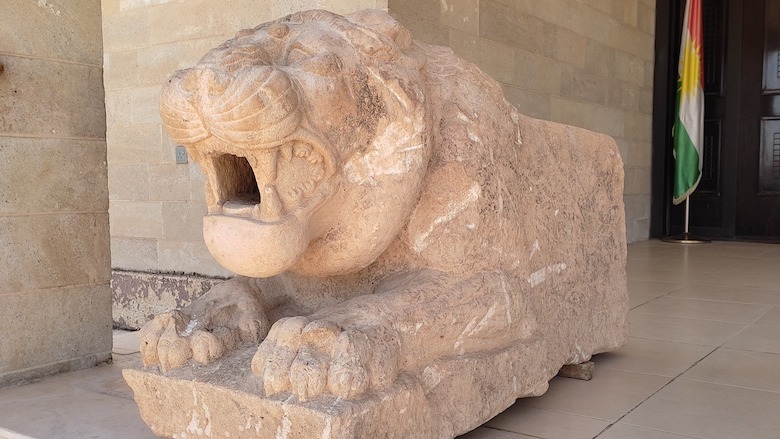Duhok archeological sites under threat from Turkey-PKK conflict

The Duhok National Museum resides in a small building in the city of Duhok. At first glance a visitor may not expect to see the ancient history of the region, but upon entering would find themself surrounded by artifacts of the many civilizations that have inhabited the area, resting closely but neatly together.
Duhok, in the north of the Kurdistan Region, is itself surrounded by proof of this ancient history. Nearby is the Charsteen cave, believed to be a Zoroastrian fire temple from the Furthian period, and a second mountain cave is nearby in the south.

The museum has a history of its own: established in 1989, it was one of the most well-known museums in Iraq. After the start of the Kurdish uprising against Saddam Hussein in 1991, the museum was shut and its artifacts evacuated to Baghdad by the Iraqi government, save for two statues from the Parthian period that were left and kept safe by local authorities.
The statues survived and remained in the museum when it officially reopened in 2013.
The museum now displays 700 artifacts, including tools from the stone age dating back to 12,000 BCE, said Dr. Bekas Brifkany, who took up the post of director of antiquities at the start of the year.

Another 4,500 artifacts are waiting to be displayed, but the museum’s small size has forced them to be held in storage until a bigger space can be found to do justice to their beauty. But the director raised another issue, saying much of the museum’s artifacts remain in the Baghdad National Museum in the Iraqi capital. Brifkany and Kurdish members of the Iraqi parliament have been trying to bring the precious objects home but have so far not been successful, he said.
Duhok has some 1,400 recorded archeological sites, Brifkany said, adding that he expects many more are still waiting to be explored.
Conflict Poses Danger to Archeological Sites in Duhok
Brifkany warned that the presence of the militant Kurdistan Workers’ Party (PKK) and ongoing Turkish airstrikes in Duhok are putting antiquities at risk.
According to officials in the province, fighting between the two has not spared archeological sites, and 79 known sites are in areas of Amedi and Zakho districts where Turkey’s operations against the PKK have recently ramped up.

Brifkany accused the Turkish army of destroying one site, Barokh Castle, in a recent cross-border operation where soldiers used bulldozers to set up outposts, as well as bombing the ancient Qumri Castle in Barwari Bala.
Caves and other natural areas the PKK uses to hide from Turkish bombs are inevitably damaged in air raids, and archeologists have no way of knowing the extent to which they are damaged because those areas are now conflict zones, he added.
Future of Archeology in Duhok
Despite the difficulties, Brifkany said the Duhok directorate of antiquity is protecting what it can, and has plans to construct a larger museum to bring attention to the history of the area. The plan is budgeted at $40 million, a difficult request given the current financial conditions in the Kurdistan Region.

Archeologists from Italy, Germany, and France have been exploring the province for more potential sites, including in Akre and Bardarash. Although their work was halted at the start of the COVID-19 pandemic, Brifkany said he was optimistic it would resume in July.
In addition, the American and French consulates in Erbil have supported the antiquities officials for renovations in Amedi and Sheikhan, he said. The US has allocated $500,000 for work on the Amedi gate, and France is studying how to renovate the remains of the Qubahan school in Amedi.

The Duhok National Museum is again open to the public amid the easing of COVID-19 restrictions, and also hosts tours for students and diplomatic missions in the Kurdistan Region.